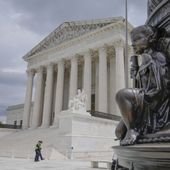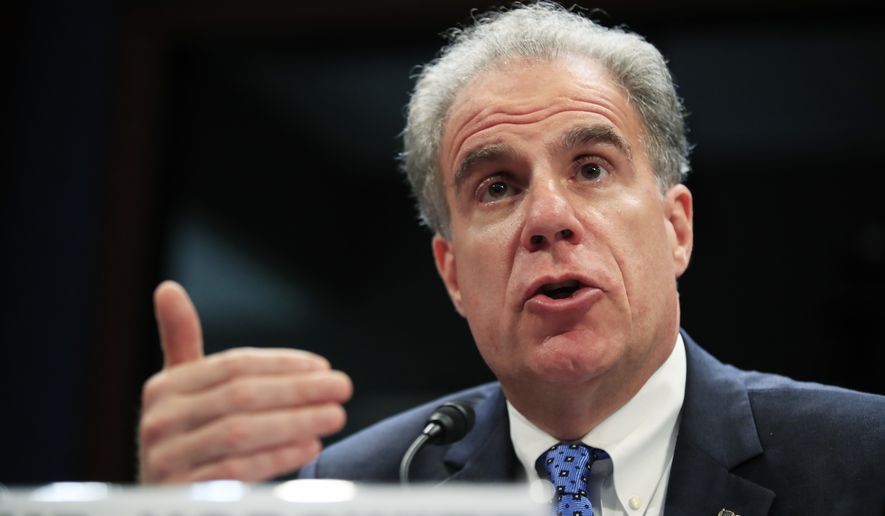The Justice Department inspector general’s report rebuts a number of Trump-Russia assertions made by key players, including the news media, former FBI Director James B. Comey and Rep. Adam B. Schiff, a leading conspiracy proponent.
The Washington Times analyzed Justice Department Inspector General Michael E. Horowitz’s 476-page history of Crossfire Hurricane, as the Russia probe was code-named, to compare his findings with public statements. His report focused on the FBI’s yearlong Foreign Intelligence Surveillance Act wiretap on Trump campaign volunteer Carter Page.
Here are some comparisons:
⦁ On Dec. 7, 2018, in closed-door House testimony, Mr. Comey adamantly denied to then-Rep. Trey Gowdy that Crossfire Hurricane targeted the Trump campaign from the start.
Mr. Gowdy: “Late July of 2016, the FBI did, in fact, open a counterintelligence investigation into, is it fair to say the Trump campaign or Donald Trump himself?”
Mr. Comey: “It’s not fair to say either of those things, in my recollection. We opened investigations on four Americans to see if there was any connection between those four Americans and the Russian interference effort. And those four Americans did not include the candidate.”
IG report: “The FBI opened Crossfire Hurricane as an umbrella counter intelligence investigation without identifying any specific subject or targets.”
A Crossfire team then was assembled and began to scrutinize the entire Trump campaign to see who might have had contacts with Russia. In August, they chose Mr. Page, George Papadopoulos and campaign manager Paul Manafort. They later added retired Army Lt. Gen. Michael Flynn, apparently because he had traveled to Moscow at one point to attend a dinner.
⦁ Mr. Comey told the Senate Judiciary Committee in May 2017 that the FBI didn’t put the Trump campaign under surveillance.
Sen. Lindsey Graham: “Do you stand by your House testimony of March 20 that there was no surveillance of the Trump campaign that you’re aware of?”
Mr. Comey: “Correct.”
Mr. Graham: “You would know about it if they were, is that correct?”
Mr. Comey: “I think so, yes.”
IG report: Mr. Comey signed the first FISA warrant on Mr. Page in October 2016 after the target left the campaign. But FISA warrants are extremely intrusive. Agents can go back in time to look at all types of communications.
Also, the FBI had assigned two informants, or spies, to Mr. Page and Papadopoulos before and during their campaign roles as advisers.
It is known that the FBI engineered an association between Papadopoulos and two informants, academic Stefan Halper and Azra Turk, while he was in London in 2016 and on the Trump team. Mr. Halper recorded their conversations in which Papadopoulos said he knew nothing about Russian hacking.
The 22-month investigation by special counsel Robert Mueller found no evidence of a Trump-Russia election conspiracy. The FISA warrant was based largely on the Christopher Steele dossier, which today has been widely discredited. Republicans call it a hoax and Russian disinformation.
⦁ Mr. Comey told reporters in 2018: “I have total confidence that the FISA process was followed and that the entire case was handled in a thoughtful, responsible way by DOJ and the FBI. I think the notion that FISA was abused here is nonsense.”
IG report: There were 17 major falsehoods and omissions of exculpatory evidence in the FBI’s four FISA applicants to FISA court judges.
Said the report: “Our review found that FBI personnel fell far short of the requirement in FBI policy that they ensure that all factual statements in a FISA application are ‘scrupulously accurate.’ We identified multiple instances in which factual assertions relied upon in the first FISA application were inaccurate, incomplete, or unsupported by appropriate documentation, based upon information the FBI had in its possession at the time the application was filed.”
In one instance, the FBI told the FISA judge that Mr. Steele had provided information as a confidential source on a FIFA soccer scandal. The application said Mr. Steele’s information was corroborated and used in criminal proceedings.
All of that was wrong. The IG said very little was proven true and none of Mr. Steele’s information was used in a prosecution.
A Washington Times query to Mr. Comey’s attorney was not answered.
Adam Schiff
The IG report rebuts a number of assertions made in 2018 by Mr. Schiff, California Democrat and chairman of the House Permanent Select Committee on Intelligence.
Then-Chairman Rep. Devin Nunes, California Republican, issued a memo alleging abuse in the Carter Page FISA wiretap.
Mr. Schiff, who was a big booster of the Steele dossier, issued a counter-memo titled “Correct the Record,” which the liberal media generally portrayed as debunking Mr. Nunes’ paper.
⦁ Mr. Schiff: “FBI and DOJ officials did not ‘abuse’ the Foreign Intelligence Surveillance Act (FISA) process, omit material information, or subvert this vital tool to spy on the Trump campaign.”
IG report: FBI committed 17 inaccuracies or omissions in four FISA applications.
⦁ Mr. Schiff: “DOJ told the Court the truth. Its representation was consistent with the FBl’s underlying investigative record.”
IG report: FBI provided multiple inaccuracies.
⦁ Mr. Schiff: “DOJ was transparent with Court about Steele’s sourcing.”
IG report: The FBI withheld exculpatory evidence. After BuzzFeed published the dossier in January 2017, Mr. Steele’s prime source told the FBI that major allegations were not true. This information was not contained in subsequent applications.
⦁ Mr. Schiff: The FBI’s use of dossier in FISA application was “narrow.”
IG report: The dossier “played a central and essential” role in the decision to start spying on Carter Page. The particular dossier memo alleged that Mr. Page talked in Moscow of obtaining bribes. He always denied this, as well as meeting with Russians Mr. Steele described. He was never charged with wrongdoing.
⦁ Mr. Schiff: “DOJ made proper use of news coverage.” This is a reference to the FBI including a Yahoo News story about Mr. Page’s trip to Moscow.
IG report: The FBI misled the FISA court by asserting that the Yahoo story did not come from Mr. Steele. (In fact it did, meaning it had no value as corroboration.)
“FBI assessed in the Carter Page FISA applications, without any support, that Steele had not ‘directly provided’ the information to Yahoo News,” the report said.
The Mueller report did not confirm Mr. Steele’s reporting and cleared Mr. Page.
“The investigation did not establish that Page coordinated with the Russian government in its efforts to interfere with the 2016 presidential election,” the Mueller report said.
News media
One of the lingering conspiracy theories in the press was that the Trump Organization maintained a dedicated computer server linking it to Alfa Bank, Russia’s largest commercial bank run by oligarchs close to Russian President Vladimir Putin.
Fusion GPS founder Glenn Simpson and Mr. Steele, whom Fusion hired with funds from the Democratic National Committee and the Hillary Clinton campaign, were the main drivers of the Alfa server conspiracy.
Mr. Steele briefed the State Department during the election. Mr. Simpson was able to place news stories, including in The New Yorker magazine.
The Trump team always denied the story. Officials said the cyber data cited by Fusion were simply from a marketing spam server outside Philadelphia. They said it was likely that Alfa employees filled out promotional cards while staying at a Trump hotel and thus appeared along with the Trump name in email traffic.
The Horowitz IG report perhaps will finally debunk the conspiracy.
“The FBI investigated whether there were cyber links between the Trump Organization and Alfa Bank, but had concluded by early February 2017 that there was no such links,” the IG report said.
Yahoo News reported in September 2016 that during Mr. Page’s public trip to Moscow in July he allegedly met with two Kremlin figures, Igor Sechin and Igor Divyekin.
This information came directly from Mr. Steele, who wrote in his dossier that the men offered Mr. Page bribes to work to end economic sanctions. Mr. Page has denied all of this.
Today, the Horowitz report discloses possible a Steele deception on which the FBI relied to gain a series of wiretaps on Mr. Page.
Mr. Steele’s dossier collection process went this way: He had a sub-source, called Person 1 in the IG report, who talked to a “primary sub-source” who had his own network of sub-sources.
Mr. Steele told the FBI that it was the primary sub-source who told Person 1 about the supposed Page meetings in Moscow.
But this person told the FBI he did not provide such information to Person 1 for relay to Mr. Steele.
Even though the FBI in January 2017 knew the information was suspect, it continued to put it in subsequent wiretap applications right to the end in September 2017.
“Despite the inconsistencies between Steele’s reporting and the information his Primary Sub-source provided to the FBI, the subsequent FISA renewal applications continued to rely on the Steele information, without any revisions or notice to the court that the Primary Sub-source had contradicted the Steele reporting on key issues described in the renewal applications,” the IG report said.
The IG said this was the worst of 17 FBI discrepancies. The bogus Moscow meeting was the nugget that convinced Justice Department higher ups to approve the wire taps.
• Rowan Scarborough can be reached at rscarborough@washingtontimes.com.




Please read our comment policy before commenting.